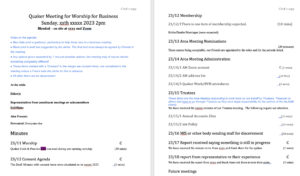I always start by putting in worship. This is a Meeting for Worship for Business, after all!
If you know the time period you’re expecting to meet then create a timeline with those starting/finishing times top and bottom.

Add in the worship periods to help people settle before the first item, and then to settle and prepare to take the results of the meeting into the rest of their day.
If you feel more silence might be needed make a note on your agenda too.
Think timekeeping when creating the agenda...

Once you’ve filled in all the agenda items you have a high-level overview, and can start to see where there may be too much listening to you read draft minutes (that you hope others have read) on the expectation that the item will be nodded through, or that the number of items requiring careful discernment is just too much for the time available. If an item doesn’t have a time-critical action point, and you know it will need additional time and consideration, don’t be afraid to postpone it until the following meeting. This doesn’t work indefinitely, of course!
Also, consider the “flow” of the meeting. I find it useful to group similar items together. While the meeting may expect things in a certain format “because that’s how it has always been done”, you can change things if you find the current system doesn’t work well.
An experienced clerk once advised me to
"remember the motivation of a promised cup of tea or lunch..."

Wendrie heywood
MBS Founder







